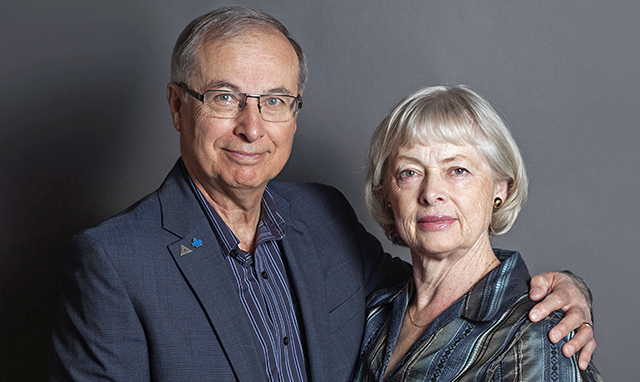
Steve Hrudey acknowledges the support and collaboration of his wife Elizabeth.
An unusual change of perspective about his engineering career led Steve Hrudey to pave a brand new path for understanding environmental issues and their impact on quality of life, locally and beyond Canadian borders. His many contributions have been recognized multiple times, most recently with Canada's most prestigious honour-he was appointed as a Member of the Order of Canada in late December 2019, one of 120 new appointments announced by Governor General Julie Payette.
"I am delighted to join this remarkable cohort of individuals who have served Canadians and been recognized at the highest level for their contributions to our nation," says Hrudey, acknowledging the support of his wife Elizabeth and family that allowed him to pursue his extensive work.
Hrudey, professor emeritus in the University of Alberta's Department of Laboratory Medicine & Pathology, began his journey in 1970 with a bachelor of science degree in mechanical engineering from the U of A, with a minor in life sciences. After graduate training in public health engineering at Imperial College, University of London, Hrudey returned to his alma mater and helped develop its environmental engineering program. The program would grow to be top of its kind in Canada over the following decade.
His time in the Department of Civil Engineering led him to realize that many environmental problems being approached from his field were linked to health concerns. "I came to understand that too many complex environmental issues are not effectively addressed because the underlying nature of the problem has not been accurately defined," says Hrudey. "So I was able, with the remarkable foresight and support of then dean Douglas Wilson, to move to the Faculty of Medicine & Dentistry and create a one-person environmental health program that explored critical public health aspects of environmental issues."
Through a Tri-Council Eco-Research Chair award, additional funding and the support of leadership such as then dean Lorne Tyrrell, what began as a one-person program in 1988 expanded to become the faculty's Division of Analytical and Environmental Toxicology, one of the most important aspects of his legacy with the U of A and Canadian environmental research.
Hrudey's work has covered elements of environmental contamination such as air, food, land and hazardous waste management, but his main focus has been on water issues. His interest was sparked in the mid-1980s, when Edmonton faced drinking water quality problems and he was asked to lead a panel to investigate these issues and provide recommendations. Later, a sabbatical leave in Australia in 1998 allowed Hrudey to work with a multi-disciplinary national research network focused on drinking water quality and safety, which had a global impact through the drinking water safety plan approach of the World Health Organization (WHO). His involvement as an expert voice for water quality issues continued in the early 2000s, when an outbreak of E. coli killed seven people and left 2,000 ill in Walkerton, Ontario. Hrudey participated in the research advisory panel for the Walkerton Inquiry, exposing systemic problems that compromised drinking water safety.
According to the WHO, contaminated water transmits diseases such as diarrhea, cholera, dysentery, typhoid and polio. A 2019 report estimates that contaminated water causes almost 500,000 diarrheal deaths in the world each year, with more than half being children under the age of five. Hrudey's research looks into how countries that should be able to provide safe water to their populations have "failures" or quality issues that result in unsafe drinking water. He has published numerous papers related to water quality and, along with his wife Elizabeth Hrudey, co-authored the books Safe Drinking Water: Lessons from Recent Outbreaks in Affluent Nations and Ensuring Safe Drinking Water: Learning from Frontline Experience with Contamination.
Hrudey's concern about the impact of environmental issues on quality of life in communities has guided not only his research, but his involvement as an expert researcher and adviser for better safety and management practices.
"I have found that the ability to interpret scientific evidence in a manner that can lead to responsible public policy decisions is somewhat unique relative to scientific research alone," explains Hrudey. "The ability to do quality scientific research is necessary but not sufficient for responsibly translating scientific evidence into public policy."
Hrudey has been driven to translate research into policy changes throughout his 50-year career. He has served on more than 26 expert panels about environmental health issues-chairing nine of them-and served 13 years on the Alberta Environmental Appeals Board, where he also acted as chair for four years. He was also one of the founders of the Canadian Water Network in 2001.
Looking back at his prolific career finding ways to improve water quality, Hrudey feels proud of his choice.
"Our quality of life is fundamentally dependent on being able to be confident that our drinking water is safe for us, our children and our grandchildren to drink," says Hrudey. "I cannot think of any more compelling reason to make this a focus of my research and publication."